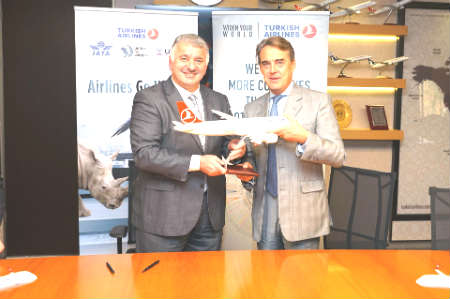The “United for Wildlife Buckingham Palace Declaration (UFW)” which was on the agenda of the 73rd IATA Annual General Meeting held in Cancun, Mexico last June, has been signed by 41 airline companies so far.
The declaration, also signed by institutions such as ACI, AFRAA, AASA and London Heathrow Airport, is aiming to stop the illegal wildlife trade of tusk, rhino horn, tortoise shell etc. as well as increasing passenger, customer, client, and staff awareness about the nature, scale, and consequences of the illegal wildlife trade.
The declaration was approved today by Turkish Airlines at a signing ceremony held at the Turkish Airlines Istanbul Headquarters, attended by Bilal Ekşi, Turkish Airlines Deputy Chairman and CEO, and IATA Director General, Alexandre de Juniac.
“With this declaration, we as Turkish Airlines are not only underlining one of the most important environmental issues of our times, trafficking of wildlife, but we are also setting an example of responsibility. Today with this signature we hope that we are contributing to the level of awareness on the issue and smoothing the path for legal enforcement procedures against the traffickers.” quoted Mr. Bilal Ekşi, Turkish Airlines Deputy Chairman and CEO during the signing ceremony.
IATA Director General, Mr. Alexandre de Juniac said; “The illegal wildlife trade threatens to extinguish many of the world’s most iconic and special creatures. The global connectivity built by the aviation industry is being exploited by traffickers, but through coordinated action with our industry partners, and assisting the proper authorities, we can help to end this dreadful trade. We welcome Turkish Airlines’ commitment to join this fight, symbolized in its signature to the Buckingham Palace declaration.”
Airlines’ commitments expression and demonstration of agreement to tackle the illegal wildlife trade are as follows;
- Adopt or encourage the adoption of a zero-tolerance policy regarding illegal wildlife trade.
- Increase passenger, customer, client, and staff awareness about the nature, scale, and consequences of illegal wildlife trade.
- Promote the Declaration and its Commitments across the entire transport sector and encourage all in the sector to sign up to the Declaration.
- Develop mechanisms to enable the transport sector to receive timely information about the transport of suspected illegal wildlife and their products, including methods of transportation, key routes, ports and other locations.
- Enhance data systems, including due diligence and risk assessment, to allow the transport sector and/or enforcement agencies to screen data and/or cargo, to identify potential shipments of suspected illegal wildlife and their products.
- Identify and promote systems for staff and the public to report suspicions in relation to the transportation of illegal wildlife and their products.
- Improve the training of staff within the transport sector to enable them to detect, identify and report suspected illegal wildlife trade, and acknowledge staff who champion this cause.
- Develop a secure, harmonized system for passing information about suspected illegal wildlife trade from the transport sector to relevant customs and law enforcement authorities, where permitted by law.
- Notify relevant law enforcement authorities of cargoes suspected of containing illegal wildlife and their products and, where able, refuse to accept or ship such cargoes.
- Establish a cross-disciplinary team working with local customs and law enforcement authorities to develop a system of best practice for combatting illegal wildlife trade in key ports.
- Support the development of mechanisms by the World Customs Organization and national customs authorities to aid the detection and prevention of trade in illegal wildlife and their products.

